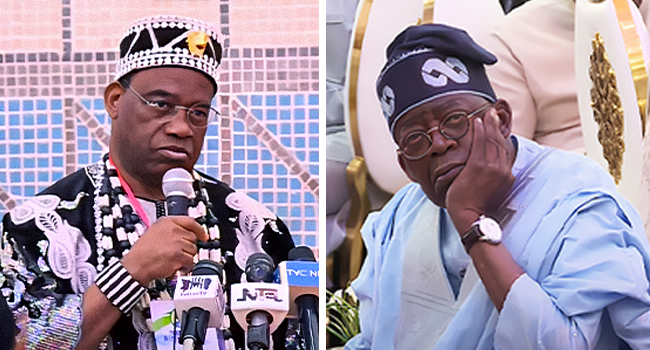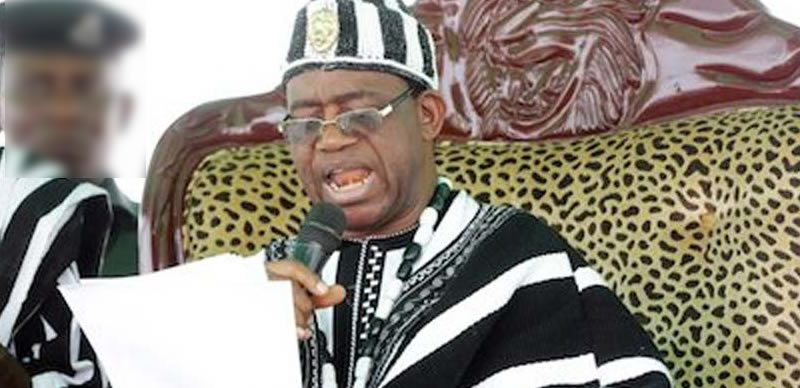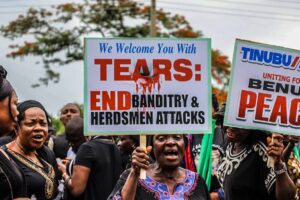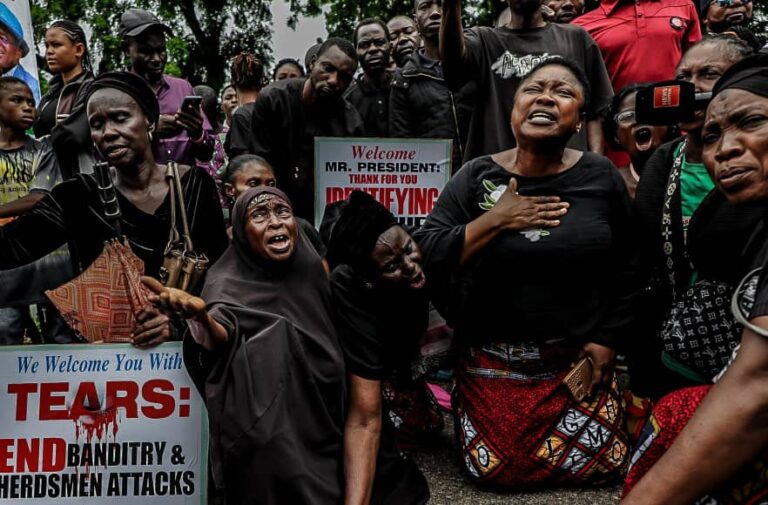
Daniel Otera
President Bola Tinubu’s recent visit to Benue State has reignited national focus on what stakeholders now describe not as a herder-farmer conflict, but a decades-long campaign of land seizure, mass killings, and forced displacement, a humanitarian and security emergency unfolding in plain sight.
At the heart of the crisis is a forceful rejection of what Benue’s traditional institutions call a “deliberate mischaracterisation” of the killings. The Tor Tiv, His Royal Majesty Professor James Ayatse, speaking directly to the President at a high-level town hall meeting on Wednesday, declared the violence a “calculated, well-planned, full-scale genocidal invasion and land-grabbing campaign,” not isolated clashes over grazing routes as often reported.
“Your Excellency, it’s not herders-farmers clashes, it’s not communal clashes, it’s not reprisal attacks or skirmishes,” Ayatse said. “Wrong diagnosis will always lead to wrong treatment… We are dealing with something far more sinister than we think. It’s not about learning to live with your neighbours; it is dealing with a war.”

Benue State, long known as Nigeria’s “Food Basket”, is now a theatre of unrelenting violence. In the past few weeks alone, at least 350 lives have been lost in separate attacks across Guma, Logo, and Yelwata communities.
Thousands more have been pushed into makeshift camps where conditions are deplorable. Women, children, and the elderly continue to die of preventable diseases, trauma, and starvation.
On the streets of Makurdi, the state capital, the pain is visible. Hundreds of women stormed the Government House, clutching placards and weeping. Some sang traditional dirges in Tiv and Idoma, mourning the loss of their husbands, children, and livelihoods.
Their message was blunt: *”We can’t go to our farms. If we go, they will kill us. Please come to our rescue.”
Many of these women are now living in overburdened Internally Displaced Persons (IDP) camps with little to no access to basic services. Clean water, healthcare, and food are luxuries; psychological support is virtually non-existent.


The Northern Elders Forum (NEF), in a statement, described the situation as genocide, accusing the federal government of indifference, negligence, and in some cases, outright complicity.
“What we are witnessing is not just failure but deliberate inaction, a culture of impunity, and an alarming collapse of national integrity,” said Professor Abubakar Jika Jiddere, the Forum’s spokesperson.
NEF’s report further warned that the portrayal of the crisis as a tribal conflict detracts from the root causes of political manipulation, criminal exploitation, and a breakdown of state structures.
President Tinubu, whose visit marks the first presidential engagement with victims since the recent uptick in violence, acknowledged the scale of suffering and pledged to invest in a long-term peace strategy.
“We cannot do without one another… I want us to create a leadership committee now to meet in Abuja to fashion out a strategy for lasting peace. And I am ready to invest in that peace,” Tinubu stated.
He also reflected on the impact of media criticism, noting that he had “learned governance lessons” from dissenting voices.
But this has done little to placate critics who argue that words are no longer enough.
“Enough of the half-measures and empty rhetoric,” NEF stated. “We demand an immediate and total deployment of elite, properly equipped security forces to Benue State. The killings must stop now.”
A review of humanitarian and government data by The Journal reveals a deepening crisis in Benue State, once revered as Nigeria’s “Food Basket of the Nation.”
More than 3,000 people have been killed in the state since 2018 in attacks attributed to herder-linked groups, according to figures from humanitarian monitors and reports by the State Emergency Management Agency (SEMA). The violence has been concentrated in local government areas such as Guma and Logo, where recurring attacks have decimated entire communities.
Currently, over two million people are displaced across Nigeria’s Middle Belt, with Benue State hosting the highest number of internally displaced persons (IDPs) outside the North-East, according to the UN Office for the Coordination of Humanitarian Affairs. Data from IOM further reveals that more than 500,000 of these IDPs are spread across 26 formal camps and 185 host communities in Benue alone.
The situation has had devastating consequences for food security. Benue, which once contributed over 30 percent of Nigeria’s yam and maize supply, has witnessed an estimated 45 per cent drop in agricultural output over the past five years. According to the National Bureau of Statistics and recent academic reviews, this sharp decline is directly linked to the mass displacement of farming communities and rising insecurity in rural areas.
Across the state, deserted farms and silent markets reflect the scale of disruption. Many schools in rural districts have been converted into overcrowded IDP shelters, leaving thousands of children without access to education.
Stakeholders warn that unless urgent intervention is made, both national food security and local livelihoods will continue to deteriorate.
A 2023 report by the Global Centre for the Responsibility to Protect (GCR2P) sounded the alarm on the escalating violence in Nigeria’s Middle Belt, particularly Benue State. The report, published in its Atrocity Alert No. 348, warned that if the killings, mass displacement, and attacks by armed groups were not decisively addressed, the crisis could spiral into a nationwide destabilisation, fuelled by ethnic cleansing, unchecked displacement, and the proliferation of arms.
The Centre noted that the increasing occupation of farmland by non-state armed groups and the targeting of civilians had forced thousands to abandon their homes and livelihoods. It also expressed concern over the government’s weak response, adding that the absence of effective protection had left many communities vulnerable to further atrocities.
The NEF has listed immediate action points:
- Deployment of well-trained military units to neutralise armed groups terrorising farming communities.
- Full-scale, independent investigation into political actors and economic interests fuelling the violence.
- Public prosecution of perpetrators and complicit officials, no matter how highly placed.
- Compensation and rehabilitation for displaced and bereaved citizens.
- Security sector reforms to include regional voices and communities affected.
For many in Benue, the time for labels has passed. Only urgent protection, justice, and a complete overhaul of Nigeria’s security response can prevent further collapse of a region on the brink.
